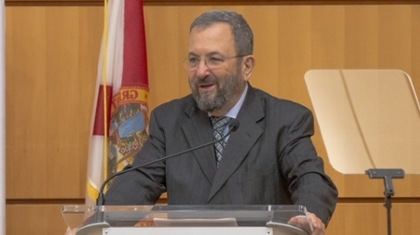With the support of the Finker Frenkel Family Foundation, former Prime Minister of Israel Ehud Barak presented at the inaugural World Leaders Lecture Series event, held on Monday, December 10, in Storer Auditorium. During his presentation, Barak discussed “Technology, Commerce, and Global Security” in today’s world.
“At the gate of 2019, the world is deep into a paradigm shift, which covers everything from World Order to politics, from the economy to the working place, from social norms to the way and the technologies we use to connect and communicate with each other; this is a time of more questions than answers,” said Barak.
“VUCA, some call it. Volatile, uncertain, chaotic, and ambiguous. The World Order we knew since WWII, based on widely-accepted rules and backed by American political clout and military might, is melting down in front of our eyes. There is no single geopolitical center of gravity. No single player, including the United States, China, or Russia, which can take on any major challenge on its own. Everything is dependent on everything else.”
Barak stated that today “the world needs leadership, international cooperation, and mutually agreed order of priorities,” but acknowledged that these are missing or are hard to achieve. He also focused on the accelerating pace of technology and its rapid change, as well as its influence in terrorism today.
“Xenophobia is flourishing. A forced explanation is the impact of social networks, which empowers the individual citizen. Decades ago, citizens had to rely on sources of authority for information. Now everyone is overwhelmed by information but also flooded by fake news, alternative facts, etc. The very algorithms of Facebook, Google, and the likes are focused on your clicks, and create an echo-chamber around every user, where all participants share similar views. The person feels empowered. Everyone around him thinks the same,” said Barak.
Though he did not mention President Donald Trump directly, he did provide insight into the opinions of other world leaders on America’s current state of affairs.
“(Security and world terror) have always been the main global threat. It assumes different shapes and forms in different times. Terror groups now effectively use the Internet for both training, communication, and even to inspire Muslims to execute terror attacks without ever seeing an ISIL or Al-Qaeda person.”
Barak reflected on his experiences with terrorism during his career with Sayeret Matkal, Israeli's Special Forces. He recalled storming a hijacked airplane at Ben Gurion International Airport in 1972, alongside current Israeli Prime Minister Benjamin Netanyahu, more commonly known as “Operation Isotope.”
A few months later, during the 1972 Summer Olympics in Munich, (West) Germany, there was another terrorist attack, where 11 Israeli athletes were killed. Barak led a commando team into Beirut, Lebanon to kill three terrorists who were involved in preparing the attack.
“The war on terror is a marathon, not a sprint,” said Barak. “The war on terror is still on, but the choice is clear: defeat terror or be defeated by it.”
Barak continued on to examine America’s relationships from a global perspective with North Korea, Iran, China, and Russia.
He concluded his lecture by providing an optimistic outlook toward the future, once it is fully realized how interconnected we are on a global scale.
“Moreover, if we won’t find a way to deal with the root causes of the challenges we face, no physical wall would be high enough here along the Mexican border, and the weeds of the Mediterranean won’t suffice to block refugees from Africa or the Middle East to cross into Europe,” said Barak. “In the longer tense, leaders should rebuild a community of nations, which deeply understand each other, realizing that we are all in the same boat, that the future of our children in the advanced world is strongly dependent of the future of their children in the most deprived corners of Earth. The present wave of inward-looking populism will have to yield to global realities and the pendulum will change direction back into the right one. The pendulum will turn back, I have no doubt about it. The only question is how long will it take and what will be the price to be paid until it happens.”
University of Miami Business School Dean John Quelch thanked Barak for a “wonderful, educational tour of the world” before they began their fireside chat.
Dean Quelch made note that it is the 70th anniversary of the State of Israel. Barak reflected on its 70 years and is optimistic about its current status.
“We are stronger than any neighbor – combination of neighbors – and should have the self-confidence that stems from it,” said Barak.
“When you think seriously of ‘where are we heading?’, you’ll end up that – especially in the last three years – we are also part of these global tendencies: a government which turns more and more inside looking, more and more depressed, more and more anxious; I think for no reason, because objectively, we are the strongest country. There is no enemy around us, including Iran at this stage cannot make anything about Israel. I think that we should have at this stage the self-confidence to decide where we want to go, what kind of Israel we want, and put the aim of relaxation of the conflicts around us as the main objective. You know, we live in a tough neighborhood. You know, the Middle East cannot be compared to the Mid-West,” he said.
“When you think about it, you know, a person cannot choose his parents, and a nation cannot choose its neighbors. They are whoever they are,” said Barak.

